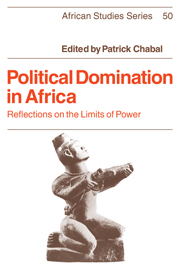Book contents
- Frontmatter
- Contents
- Acknowledgements
- Introduction: Thinking about politics in Africa
- 1 Democracy in Africa
- 2 Politics and vision in Africa: the interplay of domination, equality and liberty
- 3 Democracy and ethnocentrism
- 4 Wails and whispers: the people's voice in West African Muslim politics
- 5 Revolutionary democracy in Africa: the case of Guinea-Bissau
- 6 Civil society in Africa
- 7 Political accountability in African history
- 8 The politics of representation and good government in post-colonial Africa
- Notes
- Index
6 - Civil society in Africa
Published online by Cambridge University Press: 26 January 2010
- Frontmatter
- Contents
- Acknowledgements
- Introduction: Thinking about politics in Africa
- 1 Democracy in Africa
- 2 Politics and vision in Africa: the interplay of domination, equality and liberty
- 3 Democracy and ethnocentrism
- 4 Wails and whispers: the people's voice in West African Muslim politics
- 5 Revolutionary democracy in Africa: the case of Guinea-Bissau
- 6 Civil society in Africa
- 7 Political accountability in African history
- 8 The politics of representation and good government in post-colonial Africa
- Notes
- Index
Summary
One of the crucial issues in the unstable political life of Africa is the recurrence of authoritarian, totalitarian or despotic situations in more or less rapid institutional cycles, rather like the heavy and unequal sistema which is said to exist in Brazil. This is not as ethnocentric a question as some might like to think. In Gabon, Zaire and Kenya, Africans run high risks defending the ideal of representative and competitive democracy in the face of unyielding power. In Senegal, the Gambia, Mauritius and Madagascar, there is some form of multi-party political system. And in Nigeria, Upper Volta and Ghana, democracy remains at the heart of the continuing constitutional debate. Even in countries such as Kenya or Sierra Leone, where representative politics is being eroded, some institutions like the press or the judiciary find in liberal ideas their inspiration to resist. Equally, the internal organisation of authoritarian regimes, like those in Cameroon and the Ivory Coast, is often spoken of in terms of ‘democratisation’.
In point of fact, the immense majority of African political actors claim to be democrats. Is this merely the tribute vice pays to virtue? That was certainly the case in the patrimonial tyrannies of Guinea, the Central African Republic and Equatorial Guinea. But it is much less certain in almost all other cases where the claims of those in power to a democratic legitimacy are not merely cynical manipulation. Not that the old culturalist justification for political unanimity is any longer credible.
- Type
- Chapter
- Information
- Political Domination in Africa , pp. 109 - 125Publisher: Cambridge University PressPrint publication year: 1986
- 110
- Cited by



